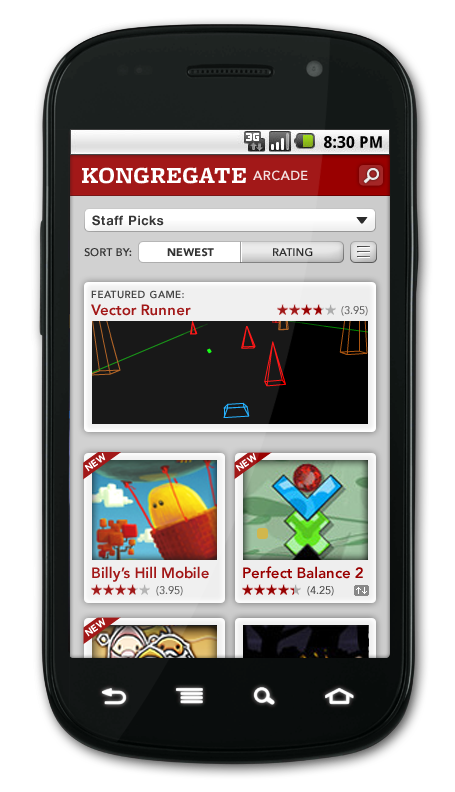You see some limitations there, then?
Well, if you go back and look, what if Facebook only had launched as a mobile app? It’d be kind of limiting. It’s hard to really have interesting communication, and meet other gamers, and communicate, and show off your status when you’ve got a tiny device.
So, the fact that we’re connecting the 13 million monthly unique players on our desktop site, and giving them a handheld experience where the account system is the same, the points, and the achievements, and a lot of the games actually crossover as well. Means it just really ties it together into an organic whole. I think a lot of the best apps that I use on my mobile phone sort of share that characteristic.
Meaning, I think Yelp is a great experience on a mobile phone, and they adapted their full-blown website very well. Our website is great for developers to upload games, for people to spend hours finding friends and talking to each other. But then, wherever they go they can take the phone version with them, which is what we are hoping for, and is the essence of what this app is. And I think that fits in very well with what GameStop is trying to do overall, which is to reach gamers on every screen that they use, be it their living room through console games, mobile, tablets, and the future, and so forth.
 Do you have any, I guess, lessons learned from this experience in terms of distribution, caveats, or anything like that, that you feel might be worth sharing with other people who are going to be distributing over the Android market?
Do you have any, I guess, lessons learned from this experience in terms of distribution, caveats, or anything like that, that you feel might be worth sharing with other people who are going to be distributing over the Android market?
Yeah. I think the main thing about Android is that it’s growing extremely quickly. It’s changing extremely quickly. Google is coming out with new versions of the OS. I don’t know if you saw some of the coverage of the Gingerbread or saw it yourself.
Yeah, I mean, it’s a radical shift. I think at the same time that they’re radically advancing it, the technology, and the vendors, and OEMs like HTC, and Motorola, and Samsung, and people are creating amazing phones. That Google is finding their way into what the exact relationship between all those vendors. I mean, you’ve got carriers, you’ve got OEMs, you’ve got Google as the operating system provider. Then you’ve got Google as an application provider and search provider.
And you’ve got thousands of developers. There’s a complex web of relationships, and I think overall, that’s a sign of a healthy ecosystem, and it’s part of what made the PC ecosystem so vibrant. I mean, if you think about it, gaming on a PC is not nearly as sort of slick and lockdown as it is on Xbox 360. And there’s a lot of advantages. The combo version is really easy to use. It’s all very curated. Then on the PC, you get something like Steam, from Valve, which is just people who are really good at games, creating a very focused experience around that.
And they were able to do that in a way that on a closed top format, I don’t thing they would have been able to do. So, we’re hopeful that the vast majority of signs that Google has sent has shown that they are looking for partners to specialize in what they’re good at, be it games, or music, or movies, or news. And provide great experiences that are sort of a blend of apps in the mobile Web. An
d I think the exact parameters around all those things are something that naturally are going to be in flux. And hopefully Google will continue to have a dialogue with the developers about that.

